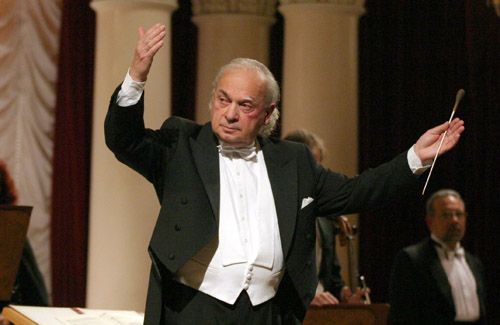“What is our life? A game!”
is the name of Roman Kofman’s new project which he presented at the National Philharmonic Society of Ukraine
The musical evening featured the card games-themed works by five composers, and maestro Kofman’s bet turned to be a safe one! He approached Shakespeare’s postulate “All the world’s a stage” with Mozart-like ease, inviting the audience to look at card games with their lifelike characters as models of earthly existence. Musicians of the National Philharmonic Society of Ukraine played masterfully, displaying amazing dedication under the chief conductor Kofman’s leadership.
Two works entitled The Queen of Spades marked the evening’s start and finish. The first of them was the overture to the operetta of the same name by the Austrian composer Franz von Suppe (1819-95), known for comic operas, musical comedies and farces. Kofman admitted it was included in the program “more out of mischief than to further a concept. I wanted also to stress the wide range of genre opportunities offered by music interpretations of Pushkin’s story of the three cards, including both cheerful, lively operetta can-can and the tragic finale of Tchaikovsky’s The Queen of Spades with its realistic bloody scenes, in no way resembling operetta.”
The suite “Four Portraits and a Denouement” from Sergei Prokofiev’s opera The Gambler allowed this master of psychological imaging to create convincing images of Alexei, Babulenka, the General and Polina, all characters of Dostoevsky’s novel of the same name. This glittering, phantasmagoric and multi-layered opus warns the spectator that the card games turn into addicts people who overindulge in it. By the way, Kofman was the pioneer presenter of Valentyn Bibik’s opera Flight in 2010, which, after being performed in concert version on the Columned Hall’s stage, was named among the most significant events of the season. Kofman’s new project called for performing Three Cards, Three Cards sequence from the fifth scene of Flight with solo pieces by Roman Smoliar as General Charnota, Anatolii Yurchenko as Golubkov, Sergii Bortnyk as Korzukhin, and Olha Tabulina as Lyuska. The scene is about more than just Charnota beating the cynical Korzukhin in a card game and grabbing a lot of money, as philosophical categories are apparent despite the gamblers’ images that mask them. It is, probably, the reason for Lyuska’s final monolog to turn into ringing, crystal-clear, almost Zen-like chant “Oh, I am tired of all of you!”
Igor Stravinsky admitted that the idea of Jeu de Cartes, a ballet in three deals, occurred to him at a poker game: “I had a thought to create a ballet where dancers in playing-cards costumes would dance against the backdrop of green cloth, standing for the gambling table. I always liked card games and cartomancy, being an avid lifetime gambler.” The ballet’s plot is made by a poker party which is played by several gamblers. Each hand opens with a march entry, as the croupier invites gamblers to the game. Lady Luck favors one gambler, and then another one, the action becomes more intense in the third hand, and the trump suit Hearts inflicts a crushing defeat on Joker in the final.
Tchaikovsky’s The Queen of Spades was represented by introduction and “Gambling House,” its seventh scene. The latter’s cast included the Revutsky Male Choir under its artistic director and chief conductor Yurii Kurach and soloists Andrii Kyrylov, Oleksandr Kyrieiev, Serhii Bortnyk, Anatolii Yurchenko, Roman Smoliar, Oleksandr Kharlamov, Oleh Yarovy, and Oleksandr Chuvpylo. The magic of the great opera, amplified by high-style performance, brought the concert to an excellent close. Let us note that all spectators received colorful concert program booklets with red-and-black card-like covers, published by LAURUS and offering Kofman’s brilliant short story about the music community’s life “What is our life? A game!”






